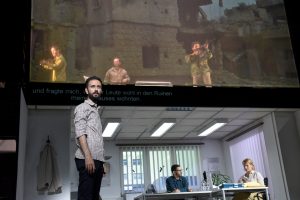Argentinean documentary director Lola Arias, who is best known for her theatre work, recently presented her debut film Teatro de guerra at the Berlin Film Festival. Related to her play Minefield that opened at the Royal Court Theatre in 2016, followed by a world tour, the film features six war veterans from the UK and Argentina who re-enact their experiences and relive their trauma of war together. A master of documentary fiction, Arias is interested in personal stories in a larger historical context, and for her new production she has chosen a highly relevant subject indeed.

Courtesy of Thomas Aurin.
Continuing her collaboration with Artistic Director Matthias Lilienthal after various productions at the HAU (Hebbel am Ufer) in Berlin, Lola Arias’ latest work is presented at the Kammerspiele. It focuses on the true story of a Syrian refugee who arrived in Germany in 2014 and whose status still remains unsettled to this day. The play is a reconstruction of Raaed Alkour’s Kafkaesque experience with German bureaucracy and shows the unfairness and inhumanity of a failing system.
After fleeing from Syria along the so-called Balkan route, Raaed Alkour arrives in Germany without a passport or any other documents that could prove his identity or the reason why he left his country. Without any evidence, he needs to convince the BAMF (Federal Office for Migrants and Refugees) that he was persecuted in Syria and should be granted asylum. His fate is decided by only one person – his case worker. The most crucial part of the process is an interview where the case worker – as a representative of the state -, an interpreter, and the applicant meet behind closed doors. For several hours, the credibility of the applicant’s story is judged. How to convince the case worker that your story is true? How does one say what they want to hear?
The protagonist is played by Raaed Alkour himself. He talks about his life in Daraa, the origin of the Syrian Revolution. He recounts how his cousin was tortured to death, the occupation of his hometown, and finally his escape after he found himself being targeted by a sharpshooter. But will this story suffice to convince the case worker?
The irony is that Alkour’s credibility is not the real problem here but the fact that he was picked up and registered in Bulgaria against his will. According to the Dublin Regulation, any refugee has to ask for asylum in the country where they were registered and finger printed for the first time, no matter how dismal the situation in that country might be.
Dominic Huber has created a standard office room complete with potted plant where the hearings take place. Michaela Steiger plays the case worker along with the other characters who decide over Raaed Alkour’s fate – a volunteer who prepares refugees for their hearings as if they audition for a play and Raaed’s efficient lawyer. Hassan Akkouch plays the compassionate interpreter who serves as Raaed’s voice, transferring Raaed’s story and providing Raaed’s answers to the case worker’s questions. Raaed Al Khour is focused and serious as he tells his story, often addressing the audience directly.
Arias also includes stories of the Syrian actors who belong to the Open Border Ensemble at the Kammerspiele – Jamal Chkair, Kinan Hmeidan and Kamel Najma. They offer some welcome comic relief as they present scenes from a Syrian propaganda film about the heroic Syrian regime or offer absurd advice to newcomers on a second level above the hearing room.
Lola Arias has done her research for this play, sadly without much cooperation from the BAMF, and presents a rather balanced view of an insane system that keeps people in limbo for years because of its rigidity and inflexibility. An important and highly relevant play that should not be missed. 4/5
Review written by Carolin Kopplin
WHAT THEY WANT TO HEAR will return on 27th October 2018.
For more info, click here…
The production is in German, English and Arabic with surtitles.


Leave a Comment